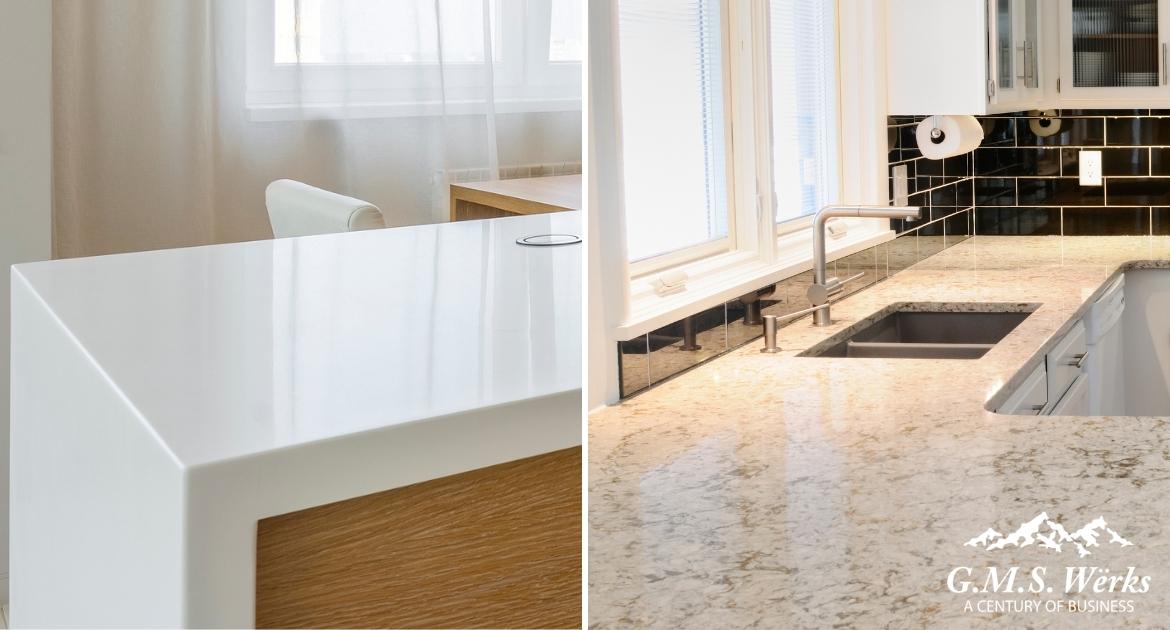-
4225 Florence Blvd
-
Appointments Recommended
Mon - Fri: 8:00am - 4:00pm
-
Schedule Your Appointment:
(402) 451-3400 - Request Quote
Mon - Fri: 8:00am - 4:00pm

As you purchase countertops, there are many choices to be made, like what color, cut and finish you want for your stone. However, before you make any of the fun decisions you have to answer one question: do you want engineered or natural stone countertops? Simply put, what separates these two choices are their fabrication and composition. Engineered stone is produced by man using both synthetic and natural materials, while natural stone is cut directly from naturally formed stone quarries deep within the earth.
At GMS Wërks, we know that both engineered stone and natural stone have their advantages and disadvantages. Here is a guide to help you decide between these two options prior to visiting a countertop shop in Omaha to make your purchase!
Engineered stones like quartz and quartzite are manufactured using ground natural stone crystals bound by synthetic resin and pigments to achieve the desired look of natural stone. In this article, we go over the advantages and disadvantages of man-made vs natural stone countertops.
With engineered stone, you have options! It can be made in a wide array of different styles and colors using different natural stone fragments and added colorants. It can even be made to imitate natural stones like granite and marble down to the texture.
Engineered stone is highly durable. It is extremely hard and resistant to cracks, scratches and cuts. Unlike natural stone, it is also non-porous, making it easy to clean and prevent staining and bacteria. It is also heat resistant, so it will not melt or scorch upon interaction with high temperatures.
Man-made stone offers the appearance of natural stone at a lower price. Its durability and low porosity also make it lower maintenance, so you don’t have to worry about the expense of sealing and repairing your countertops over time.
Although engineered stone comes in a variety of styles, it is fairly consistent. There is less room for unique elements and qualities, unlike natural stone slabs which are each completely one-of-a-kind.
The unique, Earth-grown appearance of natural stone can never be fully matched. The texture and variation of natural stone add a warm and luxurious feel to your space that engineered stone can not.
When cared for and maintained properly, natural stone can maintain its durability to sustain its best quality for a lifetime. Regular sealing will help natural stone materials resist staining, bacteria and scratching so you can save time and money on repairs over time.
If sustainability is your priority, natural stone is your best bet. Unlike man-made stone which is produced in a factory, naturally-sourced stone is quarried straight from the Earth, conserving resources, preventing pollution and minimizing waste.
The luxurious look of natural stone can come at a luxury price point, but it is well worth it. Not only will it deliver aesthetically and functionally, but it is also appealing to homebuyers, which can help you sell your home faster and for maximum return on your investment.
Having difficulty choosing between man-made vs natural stone countertops? You’re in luck! Not only does GMS Werks carry a variety of both engineered and natural options, but we can answer any questions that may have gone unanswered and provide any additional information regarding man-made vs natural stone countertops. That way you can choose the right stone to fit your aesthetic, budget and lifestyle. Contact us today or visit our countertop shop in Omaha!